
As Pagans, we can merely observe the eight High Days and then move on with our lives. As Devoted Pagans, we develop a daily practice that helps us to build better relationships with the entities, spirits, and allies in our lives.
This is the sixth in a series of “Building a Devotional Practice with” presentations. The first three dealt with the Land, the Sea, and the Sky. In this offering, we conclude our discussion of building devotional practices with the Kindreds. The first of our Kindreds discussions was about building a practice with the Ancestors, while the second concerned building a practice with the Spirits of Nature. This presentation will deal with the Shining Ones, the Gods and Goddesses.
The Shining Ones
I divide the Shining Ones into three groups. The first are Gods of a given hearth. Odin would fall into the category, as would Dagda, Zeus, Jupiter, Agni, Perkunas, and the list goes on.
The Gods are male entities in the pantheons that were worshiped (and may still be worshipped) in ancient hearths. A second group are Goddesses of a given hearth. Hera, Freya, Danu, Ariniti, and Venus, are examples of Goddesses.
The Goddesses are female entities in the pantheons that were worshiped (and may still be worshipped) in the many hearths.
A final group of Shining Ones are non-gendered or differently gendered entities. The Gatekeeper, elementals, like Wind, Rain, and Fog, and the Spirits of Inspiration may be gendered, non-gendered, or differently gendered, depending upon the hearth culture. If no hearth culture is associated with them and they assume a generic character, no gender is necessary.
Oddly enough, the Outsiders may fall into this last category as well.
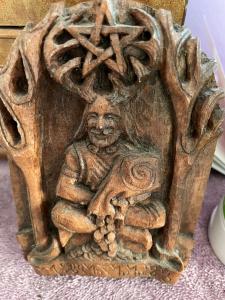
The Gods
The first group, the Gods of a given hearth, are known by their names and by their descriptions in the lore. We are aware of Zeus because of the associations that go with his name along with the stories that we have read in the lore. While my first exposure to Zeus was through Edith Hamilton’s Mythology, there are many other sources as well. We know that Zeus is the King of the Gods, son of Kronos, and vanquisher of the Titans. He is the God of thunder, storms, and weather, to name several of his attributes.
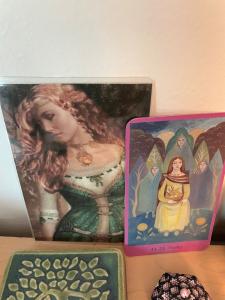
The Goddesses
The second group, the Goddesses of a given hearth, are known much in the same manner. We are aware of Boann, the Goddess associated with the river Boyne in Leinster in Ireland, because she appears in the lore, in the Lebor Gabála Érenn, to name one of the sources, with Táin Bó Fraích as another. She is a mother goddess and is associated with water, as evidenced by the river that bears her name.
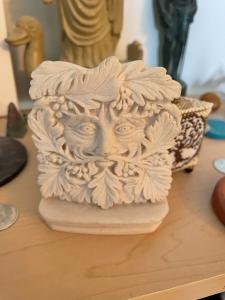
Other beings
The final group, elementals and unique or unusual deities, are also know by the lore or by our experiences of them. While we may find references to Wind, Earth, and Sky in the I Ching, or Book of Changes, the correspondences between the descriptions found therein and those found in other places may vary widely. What differs about these entities is that their names are descriptive as opposed to being proper names.
While we may know Heimdall as the Gatekeeper of the Rainbow Bridge, that expanse that separates Midgard, this middle world, from Asgard, the realm of the Aesir, the concept of the Gatekeeper is used in ADF cosmology to represent the entity that helps to open the gates between tis world and the worlds of the Ancestors, Nature Spirits, and Shining Ones and hold the open. This construct is a relatively new concept, as such, although one can find an early reference to the Gatekeeper in early Anatolian myths.
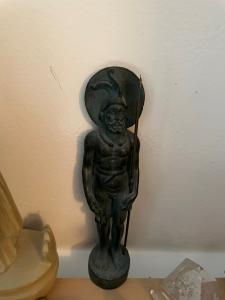
When we come to neopaganism, it is typically these Gods and Goddesses and entities of power that draw us in. We are attracted to the sheer power of these Goddesses and Gods. We are attracted to entities that can bend the laws of physics, that can make something out of nothing, and who can truly do wat they will. In fact, the entire pursuit of magic may be explained as a way of approximating the power and will of the Gods and Goddesses.
The divinities are discovered through need
One discovers the divinities through need. When call out to powers greater than us when our powers, when our abilities are not sufficient to accomplish the critical things that we need to get done. This typically occurs with the sickness of loved ones, the loss of status or employment, or the need for a loved one. When we can no longer make a difference, we turn to those who can: The Goddesses and Gods.
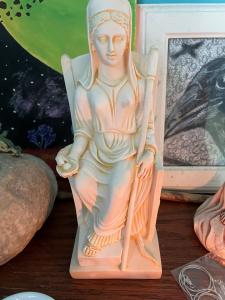
Is it sufficient just to reach out to the Gods and Goddesses and ask for the things that we need? Perhaps, but I think not. These entities live in an entirely different realm of existence, and it is hard to say whether they have a frame of reference for humans and the affairs of humans. If we are to consider the lore, we do see the Gods reaching out to mortals from time to time, but most often it is for their needs, not necessarily ours.
In ADF cosmology, we believe in the concept of *ghosti, a reconstructed proto-Indo-European word that talks about the reciprocity of being a good guest and of being a good host. One must be welcoming before one may be welcomed.
Let me give an example: if I walk up to a stranger on the street and say, “give me some money” or “give me a girlfriend or boyfriend”, you would most likely walk to the other side of the street, rather quickly, and never give me another thought.
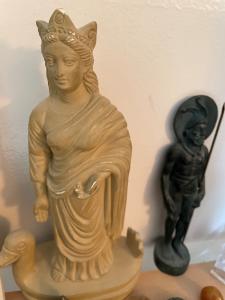
If, on the other hand, I make you welcome first and we get to know each other, you may be more inclined to give me a loan of money, especially if you believe that I will give it back or give you something in return. When we reach out to others to accompany us on our path, it is usually through some commonality first that allows us to meet halfway and develop a common understanding or pursuit.
How to build a relationship with the Shining Ones
How do we build a relationship with the Shining Ones? In some instances, we find the Shining Ones on our own. We have an interest, we do some research, and we begin to make offerings to them. These are the fundamental steps in building a relationship: interest, finding out about someone else, and being a good host and guest.
Sometimes, the Shining Ones find us, through dreams, through insights and intuition, and, in rare cases, through direct contact. In this case, it in up to you whether you are interested in the Shining One that presents themselves to you. If some, find out about them as they find out about you, and make offerings.
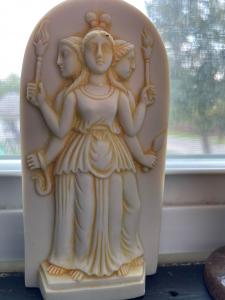
In situations where no one presents themselves, be patient. Make general offerings to the Shining Ones and, over time, see if they reach out to you. Building relationships takes time. Building lasting relationships takes even longer.
Where and why
In addition, where do we build a relationship with them? I think the best place for any kind of devotional is at an altar or shrine. For the Gods and Goddesses, this altar or shrine can be almost anywhere. It can be in our homes, our vehicles, or our back yards. Yet, calling to the Gods and Goddesses and spirits can be done anywhere.
Why should one embark upon devotionals and what exactly does that mean? The Shining Ones are entities of greater power than us. From time to time, we will need them to help with health, wealth, wisdom, love, a myriad of things. Instead of just calling out when you need something only, I believe it is best to establish a relationship that is built on love, understanding, and offerings. When one becomes devoted to one or more of these entities, one makes establishing and maintaining a relationship a part of the daily (or weekly) lives by making it a part of our practice.
Practice is the work we do.
Welcome and thank
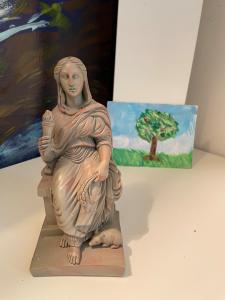
Above and beyond asking for something, the first act of devotion is to welcome and to thank. Begin your devotional practice by welcoming the entity and setting the scene for the work that you are about to do.
“Hail, Boann, mother of my people, on this bright beautiful day. Thank you for being a part of my life”.
This follows my suggested formula of Welcome-Set the Scene-Thank.
“Hail, Boann, mother of my people”
This welcomes this Goddess with the word “Hail”, which to me is synonymous with “Welcome”. I additionally assign to her the title “mother of my people”, as in mother of my tribe. While this is an honorary title and not necessarily historically accurate, it is how I see her in my life.
“On this bright, beautiful day”
This sets the scene and fixes me at a certain point in my world. It conveys that knowledge, that awareness to the deity in question, in this case, Boann, Goddess of the river Boyne.
“Thank you for being a part of my life”
Welcome-Set the scene-Thank
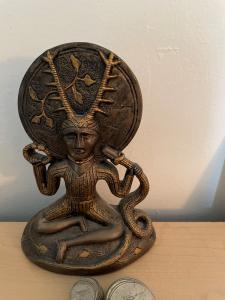
One of the fundamental rules of hospitality is thanking the other entity in our relationship. More than anything, I am thankful for the things I already have in my life first before I even consider the thought of asking for more.
When we awaken, we should be thankful. We are granted another day on this Earth. We stand on the Earth Mother. The sea surrounds us, the land stretches about around us, and the sky extends above our heads.
Once this preamble of Welcome-Set the Scene-Thank has been established, the devotional can end at that point. This is the fundamental component is the devotional. For it to be complete, in my opinion, an offering needs to be made before ending your practice. This can be my pouring a libation, perhaps a part of your coffee or tea, as an offering to the entity of your choice. An offering can be a poem, a song, or a flower. It should be an act of kindness and respect. It may even be words, be they many or few.
“I honour and I thank you, Boann”.
This statement, in and of itself, gives honour to Boann and thanks her.
Offerings
Yet what offerings should one make?
Think about your relationship to the entity at hand. Are their items that you feel are important to that Goddess, that God, or that entity that is readily available to you? An offering does not have to cause a hardship to be accepted. A libation of coffee, tea, water, whiskey, any number of household items may work as an offering. A gift, given with an open and loving heart, is a good gift. If you are unsure of what offering to use for a particular entity, ask the entitywhat it would prefer.
How does one do this? Sit, stand, or lay next to the place where you choose to make an offering. Listen to the world around you. Be still and listen. Close your eyes. After some time, you will feel a rhythm around you, the sounds of the place. Open yourself up as you immerse yourself into the sound and see what impressions come your way. Some may be subtle; some may be very direct and clear. Trust your intuition; trust yourself.
A good offering
A good offering is a poem or a prayer. It may be a song or a drawing. It may be something drawn in the air or on paper. Open your senses so that you can receive impressions from the world around you. Listen and learn. As you spend more time in your sacred place, with the Shining Ones, you will come to a greater understanding of them, and they you.
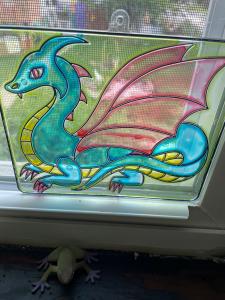
Final Thoughts
Building a Devotional Practice with the Shining Ones helps us to understand and cherish those who beings of wonder, of power, and of magic in our worlds. They are often beyond our comprehension or understanding. The more we work with them and the more they work with us, the better our mutual understandings.
We look to the skies, as we think of the Shining Ones. We often feel that they are looking down on us from above, or perhaps they are observing us through a totally separate lens of reality. It is obvious that much of the magic in our world is touched, directly or indirectly by those Gods, Goddesses, and elementals that we collectively call the Shining Ones. We open our palms upwards to receive their blessings and we give offerings and thanks.